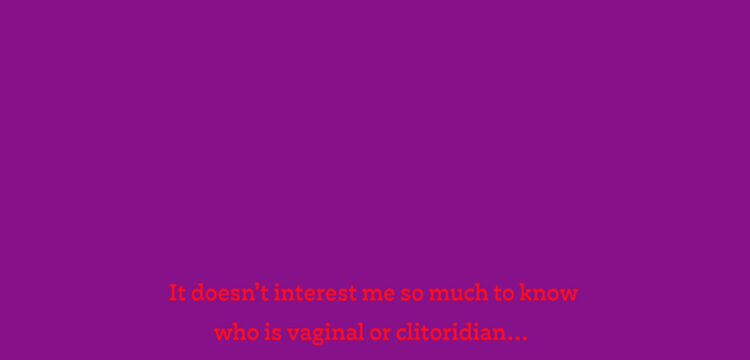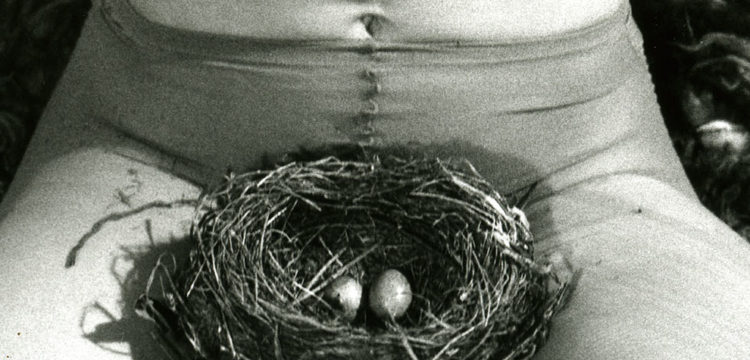Sisterhood Forever
Rosa & Louise – A Feminist Manifesto in Dialogues
The examination of the structures of feminist discourse forms the basis of the manifesto that is continuously rewritten by Ariane Koch and Sarina Scheidegger. The multilingual performance was shown in different stages and contexts as a performance—spoken by two performers—and as a poster edition. How can and does feminism be articulated in different cultures? How can we relate to it? Who is speaking? Who is allowed to speak? How are stereotypes and clichés reproduced and negotiated? Where are the intersections in discourse that differs depending on the national, geographic, historical, cultural, or social context in which we live—but is also similar in many ways? Where can we use the feminist perspective to establish general societal questions? How can feminism be a tool to broaden and renew history [for all of us]?
Here, an excerpt of the iteration Rosa & Louise – A Feminist Manifesto in Dialogues, which will be performed in English, Italian and German, as part of SPRINT—Independent Publishers and Artists’ Books Salon, on November 26th. You will also find us and our books, among a very rich selection of other independent publishers, exhibitions, performances, screening and talks.
Among others, the exhibition HARD COPY SOFT TOUCH – Experiences on Queer & Transfeminist Archive with Archivo de la Memoria Trans (Argentina), Centro di Documentazione Aldo Mieli (Carrara), Compulsive Archive (Milano), Feminist Findings by Liberation in Print Collective edited by Futuress (WW), Queer Reads Library (Hong Kong) and Queer.Archive.Work. (Providence, US & beyond). Each of the involved realities in the exhibition has a peculiar approach to the subject of the Archive and how it feeds and evolves depending on the collaborations, contributions and methods of access and interaction with the public between off/on line dimension, to amplify the voices and the social, political, generational messages behind, which often have a present echo in their claims and emergence of the desire for expression, recognition, rights and willingness to act and react supported and in support of a community.
Beside the performance Rosa & Louise – A Feminist Manifesto in Dialogues, this edition, the Istituto Svizzero supports the organization of a number of initiatives featured as part of SPRINT, specifically the Risograph Workshop, the exhibition The Most Beautiful Swiss Books, the screening of the documentary Memory: The Origins of Alien (2019) by Alexandre O. Philippe, and the meeting Unlocking Potentials – The Art of Publishing Books.
M: Vorrei che ci fossero modi diversi di stare insieme
Non basta che tu pianga quando piango anch’io
Non basta che mi assicuri che sono una persona completa anche senza figli
Non basta che ora anche tu indossi pantaloni viola
A: Es reicht nicht, uns zu wählen, wenn euch keine andere Wahl bleibt.
M: Non ci sono solo crepe tra quello che dico e quello che voglio dire. Sono stata citata male.
A:
Misunderstood
Mistranslated
Misread
Misinterpreted
Miswritten
Misseen
Mistreated
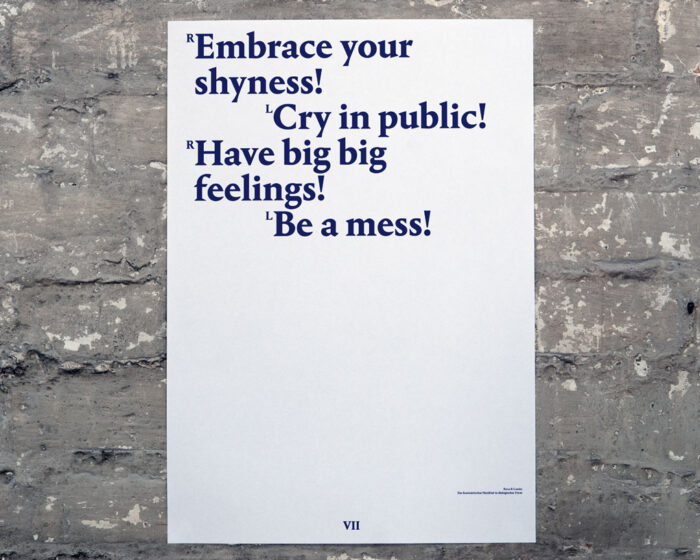
M: La pittrice dipingeva come nessun altro. Sulle sue tele le figure erano simili a corpi celesti luminosi, come una speranza nella notte, come la promessa che le cose miglioreranno, un giorno.
A: The problem is, we’re always talking about someone who isn’t actually here. We don’t know her name. We cannot say where she grew up, if she would describe her childhood as happy, if she laughed in the photos and if her parents allowed her to have a birthday party. We can’t say if she likes cake or has ever liked cake. We can’t say whether she has ever been subjected to violence. Although we can say that she is quite likely to have been subjected to violence at some point. We can’t say if she was sleepless, if she loved the sea, if she liked watching the seagulls, if she knew the Sheik Ali bar, if she imagined things differently than they were. We can’t say if she liked to read, but we imagine that she liked to read, because in our minds she is the translator. In our minds, the translator is a universal genius and a utopia. In our minds, the translator translates everything we are unable to understand and that is almost everything. The translator illuminates the darkness. In our minds, and we admit we tend to romanticize, the translator is similar to a magician.
M: Quindi esiste ancora, il sole. Ed esiste, dopotutto, il desiderio. Se solo sapessi di cosa.
A: Selbstvergessenheit?
M: Vita a due?
A: Einsamkeit?
M: Visibilità?
A: Unsichtbarkeit?
M: Fight?
A: Einzelkämpferin?
M: E che ne dite del supporto?
A: Sorry, keine Zeit
M: La donna esaurita?
A: Self Made Woman
M: Vai a truccarti
A: Ich will keine Maske
M: I AM DONE WITH CUTENESS!
A: I was dressing like a man and I liked it
M: I was disappearing in the night and I liked it
A: I was never to come back and I liked it
M: I was running into the wild and I liked it
A: Gender as a situation, I like that, situations are sometimes better, sometimes worse
M: Compro una piccola scultura di ceramica, un piccolo pinguino con il becco, i seni e i peli del petto.
A: Bezeichnen Sie das jetzt als männlichen Feminismus?
A: My smile is soon falling off my face, falling to the floor, the red lips, lavishly made up, first the foundation, then outlining the contours, then lip stick, then fixing gloss, spattering onto the floor, a red mark, red splashes in every direction, and the photographers, they press the shutter like lunatics, point their lenses at me, at my smile on the floor, then back at me again, standing now, completely without a mouth, in pleasant helplessness.
M: Prima che gli sguardi degli altri cadano, li catturo con gli occhi e li riconduco all’osservatore, che spesso distoglie i suoi per la vergogna.
A: She rises, she rises, she rises. She is waving her knife. She moves up and up. She rises, she rises, she rises
M: I HATE RUNNING AROUND FOR PATRIARCHY.
A: I HATE DREAMING OF CURATORS.
M: I HATE DREAMING OF THE COMMISSION JURY.
A: I HATE ADMINISTRATION.
M: I HATE ALL YOU CAN EAT.
A: WHEN SOMETHING IS DEAD, DOES IT BECOME HISTORY?
M: I CAN ONLY ALTER MY APPEARANCE TO A CERTAIN AMOUNT.
A: Where are the other archives?
M: Where are the other narratives?
A: The ones you were hiding so well for so long.
M: The ones who were here in front of us all the time.
A: As long as we can remember
M: We remember now.
A: But when can we remember differently?
M: When do they tell these other narratives?
A: I’ve tried my best. But it was not enough.
M: I’VE TRIED MY BEST.
A: But it was not enough.
M: It was too little.
A: It is too little, always.
M: You want more, always.
A: You want everything, always.
M: Ma non ho bisogno di possedere altro.
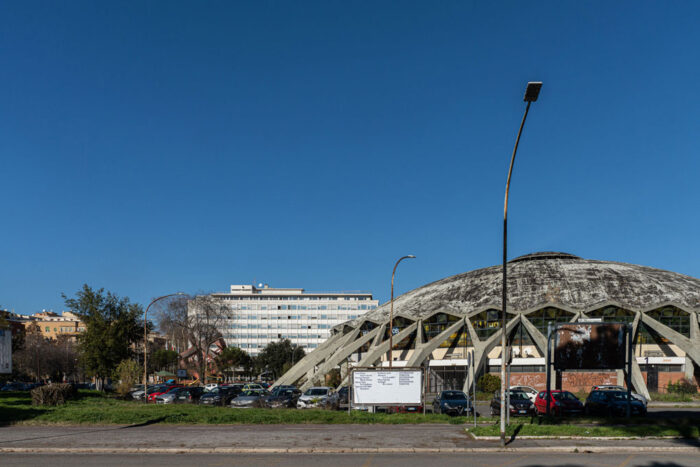
A:
Be afraid!
Be fearless!
Make sure you are heard!
Keep asking until you get an answer!
Embrace your shyness!
Cry in public!
Have big big feelings!
Be a mess!
Beide: SISTERHOOD FOREVER, SISTERHOOD FOREVER, SISTERHOOD FOREVER
M: Chi porta me
Quando non posso più portare nessuno
Dietro di me vengono quattro bambini
Uno dei quali è troppo piccolo per camminare
E così è portato da un bambino più grande
Sotto il sole cocente
A volte un camion ci porta
A volte no
Sandali consumati
A: And I remember when your feet were burned by the hot tar of the streets, I remember I was caressing them, hoping you would never have to walk on fire.
A: My shoulders are longer than my body and stronger than your power moves!
M: Non possiamo parlare per tutti.
A: Wir können nicht für alle schweigen
M: Mi piacerebbe che le orecchie mi uscissero fuori dalla testa.
A: My back tends to bend; I have to carry these chairs all the time, but the chairs should carry ME, they should support ME, the chairs are so uncomfortable to carry, I have a hump, I’ve become a hunchback woman. I think people should carry their chairs themselves. I don’t want to have to carry everything. Everyone carries their own chair from now on.
M: C’è stata una scena curiosa: il Capo di Casa mi ha invitato a parlare di me in pubblico, ma si è scoperto che era solo un’opportunità per lui di parlare di se stesso. Mi si è messo accanto e ogni volta che aprivo la bocca, lui iniziava a parlare. Credo che la gente abbia pensato che fossi io a dire quelle parole, ma non è così, lo giuro.
A: Du sagst mir, wenn Sprache die Welt strukturiert, dann muss sie auch in der Lage sein, die Welt zu verändern. Ich sage ja, aber die Zukunft der Sprache, die Zukunft dieser Sprache hier, diese Sprache, die wir gerade versuchen zu sprechen, die Sprache, die wir mit euch und unter uns sprechen, diese Sprache und die Zukunft dieser Sprache, die bleibt uns ungewiss und verborgen.
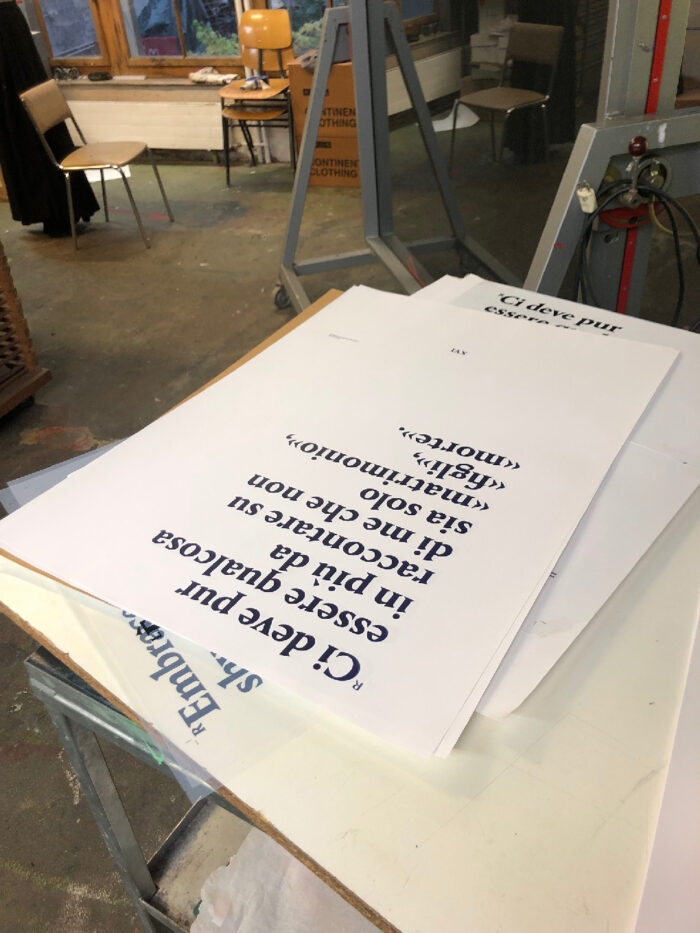
M: Tu dici: se il linguaggio struttura il mondo, allora deve anche essere in grado di cambiarlo. Sono d’accordo, ma il futuro della lingua, di questa lingua qui, quella che stiamo cercando di parlare in questo momento, la lingua che parliamo con voi e tra di noi, questa lingua e il futuro di questa lingua rimane per noi qualcosa di incerto e misterioso
M: Ho visto una performance con 22 donne nude. Una di loro aveva 81 anni, un’altra ha sezionato un ratto sul palcoscenico. A volte tagliavano la legna, andavano in moto o scendevano le scale.
A: Did you like it?
M: Non lo so. Ma ho capito che in questo modo qualcosa veniva riconquistato,
qualcosa che per molto tempo era stato occupato veniva finalmente restituito ai corpi nudi di queste donne.
A:
Its cause you are not here.
That I am
And that I see
Flickering
Everywhere
Its cause you are here
That I am
And that I see
Streams
Everywhere
Beide:
Its cause we are all here
That I am
And that I see
New waves
Everywhere
They will be fierce
They will be loud
They will be shiny
They will cover you
And they will stay (as long as it takes)
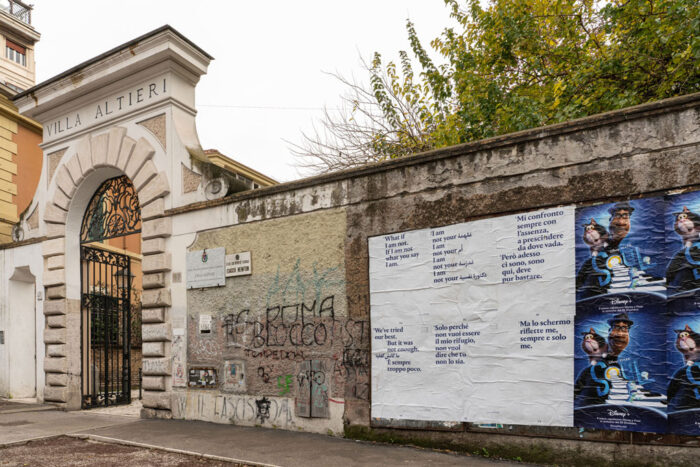
M: Hey Rosa
A: Ja, Louise?
M: Ho finito i proiettili
A: Einfach nachladen
M: Sì, ma con che cosa?
A: Zitate, Tränen, Freundschaft?
M: Empatia, conoscenza, canzoni d‘amore?
A: Mit mehr Archiven und Geschichten
M: Più di quanto possiamo immaginare.
A: Ich denke wieder öfters an meine Grossmütter, an die Demut der einen und an den Grössenwahn der anderen
M: Alle loro pazze risate
A: How does the laughter of a feminist resistance sound like?
M: Io penso spesso a mia madre, è umile e megalomane al tempo stesso
A: Und wir, was sind wir?
M: Perché te ne sei andata?
A: Ich bin nicht weggegangen, die Welt ist weitergegangen
M: Vuoi dire che le cose cambiano, compreso questo testo?
A: Manchmal weiss ich kaum mehr wie mich bewegen in diesem alten Leben. Alles fällt auseinander, insbesondere die grüne Jacke, die mich einst so stark von der Umwelt unterschied. In mir drin eine neue Zusammensetzung.
M: Che ne dici di una nuova fodera interna?
A: Was für Temperaturen brauchen diese Archive hier?
M: È la birra analcolica?
A: The living archive
M: Quando fa troppo caldo
A: Then it is too cold
M: La nostalgia non ci riporterà indietro
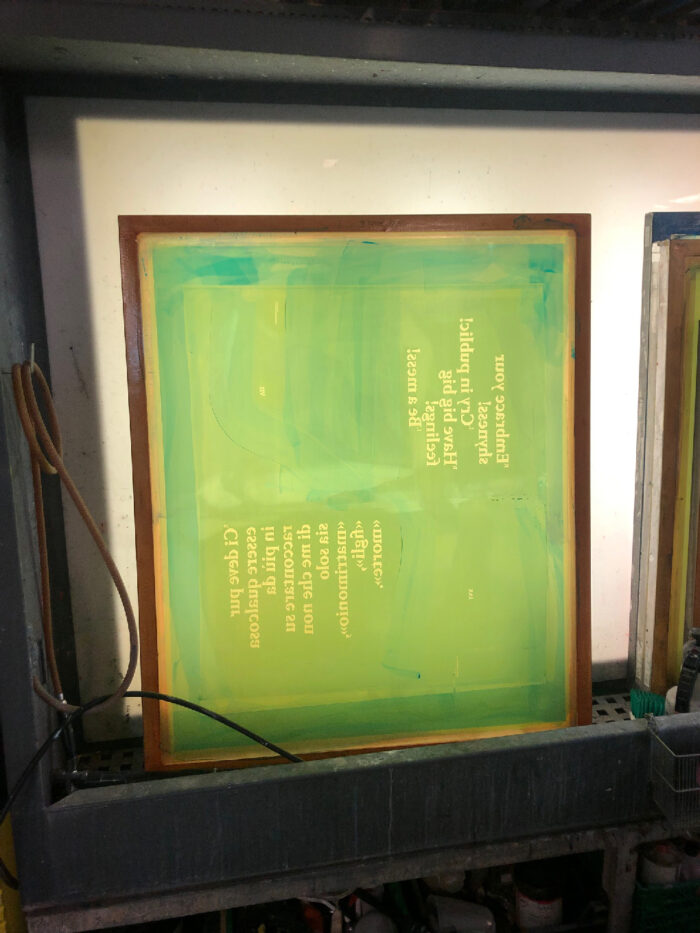
A: Gefühle werden uns weiterbringen, sogar Traurigkeit
M: Ho disimparato molto delle cose sbagliate che mi sono state insegnate
A: Ich habe viel gelernt
M: Io ho scoperto molto
A: Ich habe viel geträumt
M: Io ho molto dimenticato
Le persone che camminano sotto la pioggia sulla Lothringerstrasse hanno l’aria di cani bastonati. La pioggia sembra voler costantemente ricordare loro qualcosa che non devono dimenticare. E come sempre i loro volti si illuminano quando il cielo si rischiara e si rabbuiano quando si fa scuro. Sempre e di nuovo la pioggia cade su queste anime cupe, colpisce i loro crani, tuoni e fulmini. Così camminano come cani bastonati, con la faccia scura degli esseri delusi, su questa Lothringerstrasse – che ancora adesso si chiama Lothringerstrasse, ma che forse un giorno, con l’avanzare della civiltà, verrà ribattezzata in qualche altro modo, perché la civiltà che avanza rinomina sempre le cose; dopo tutto, nessun nome dura per sempre, non nomi di cose che a un certo punto muoiono da sole, comunque.
A: Adelheid Duvanel Strasse?
M: Affidamento Strasse?
A: Rosi Braidotti Strasse?
M: Non vuoi una strada anche tu?


